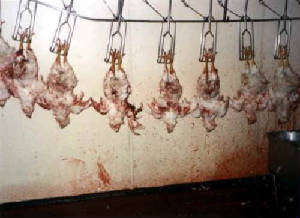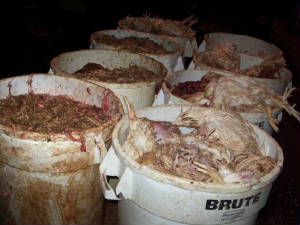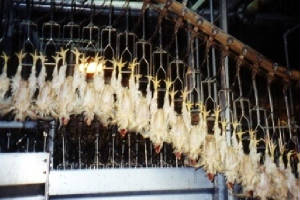|

Birds
Virtually
all U.S. birds raised for food are factory farmed. Inside the densely populated buildings, enormous amounts of waste accumulate.
The resulting ammonia levels commonly cause painful burns to the birds’ skin, eyes, and respiratory tracts.
To reduce losses of birds pecking each other,
farmers cut a third to half of the beaks off chickens, turkeys, and ducks. The birds suffer severe pain for weeks. Some, unable
to eat afterwards, starve.
Egg-Laying Hens
Packed in cages (typically less than half a square
foot of floor space per bird), hens can become immobilized and die of asphyxiation or dehydration. Decomposing cropses are
found in cages with live birds.
By the time hens are sent to slaughter for low
production, their skeletons are so fragile that many sufer broken bones during catching, transport, or shackling.

To ease handling, birds raised for meat are usually paralyzed via electrical stunning. However, it is not known whether
stunning renders the birds unconscious; the shock may be an “intensely painful experience.” Each year, large numbers
of chickens, turkeys, ducks, and geese reach the scalding tanks alive and are wither boiled to death or drowned.

In January 2007, a Mercy
For Animals investigator too a job at one of the nation’s largest poultry slaughterhouses to witness the conditions
firsthand:
Birds with broken legs and wings, open wounds,
and large tumors were shackled and hung on the slaughter line; some of the injured were left writhing on the floor for hours
beforehand. Workers punched, kicked, threw, and mutilated live birds; they tore eggs from the birds’ bodies to toss
at coworkers, and ripped the heads off birds that were trapped inside the transport cages.
In2005, at an even larger plant, a PETA investigator
saw many birds mangled by the throat-cutting machines; workers yanked the heads off birds that missed the blade.
For the undercover footage and further details
on these and other slaughterhouse investigations, see:
VeganOutreach.org/video
|
